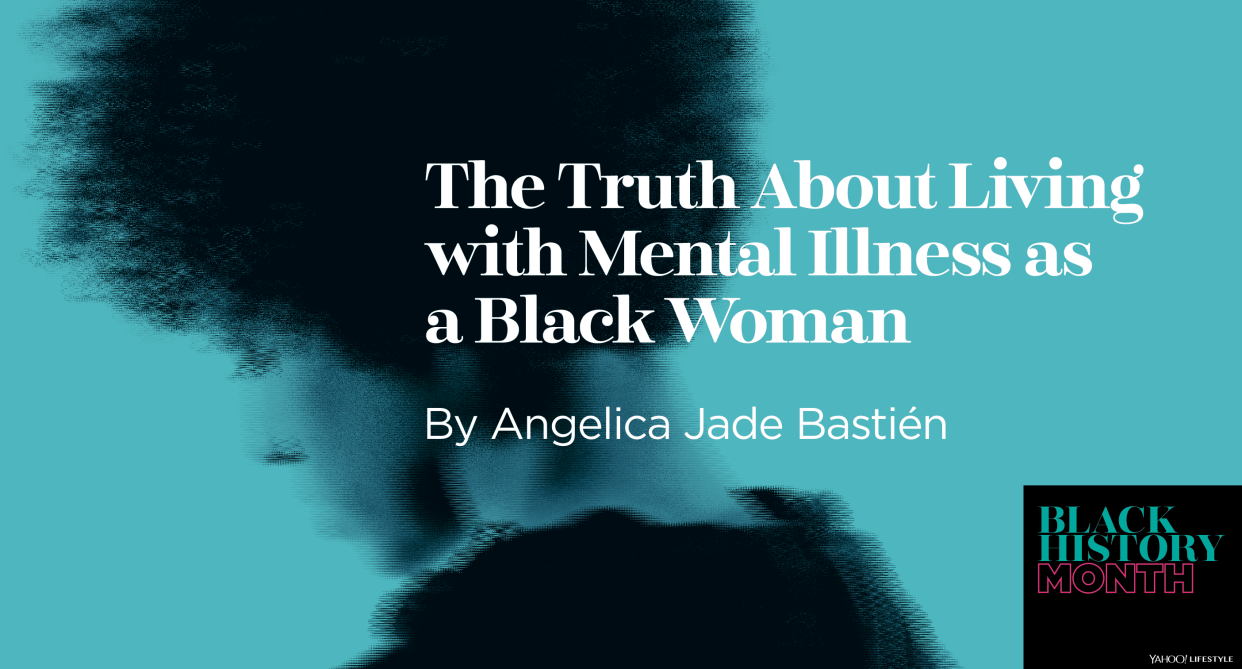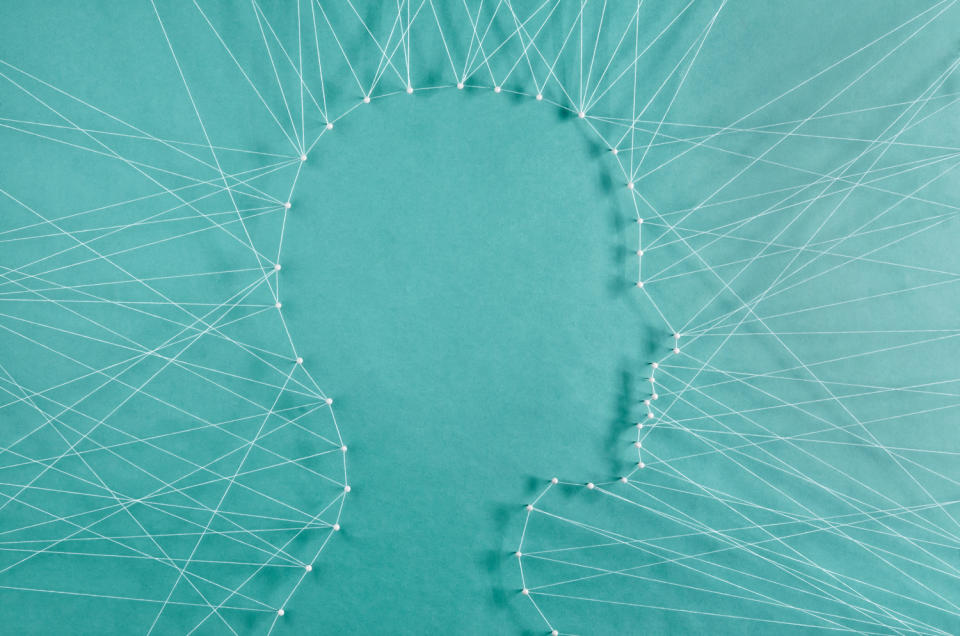Why trying to be a 'Strong Black Woman' makes it harder to cope with mental illness

What does it mean to be black today? For Black History Month, Yahoo Lifestyle will explore this question in wide-ranging personal essays, video features, and Q&As that focus on the nuances of black culture. In this personal essay, writer Angelica Jade Bastién tells the story of her mental illness and how it’s been complicated by the “Strong Black Woman” archetype.
In late November 2017, just as the air grew crisp in Chicago and jack-o-lanterns still lined the streets, I was institutionalized in the wake of a suicide attempt.
This was not my first hospitalization. At ages 13 and 17, I had found myself in similar circumstances. But at 28, such an event had an even bigger effect, a profoundly destabilizing effect — the wave of its impact far wider than any I had previously known. Months later, I am still mired in recovery, still parsing out the circumstances that led to my hospitalization.
Much of what happened remains bundled into emotions I haven’t fully untangled, but what I do know is this: Outside help pulled me through. My friends and colleagues rallied around me, and it was they who, the day after I tried to take my own life, were able to connect me with the executive director of the Chicago branch of the National Alliance on Mental Illness. She stayed with me on the phone throughout that afternoon and ultimately accompanied me to the hospital where I planned to get a psychiatric referral. In that day after I had been trying to die, her voice was my tether to reality.
When we arrived at the hospital, a crisis worker decided that my desire for a mere psychiatric referral wasn’t enough; I needed in-patient hospitalization. I didn’t voluntarily decide to be hospitalized. I was so distraught after the night before that I couldn’t comprehend what was going on. I didn’t understand that the crisis worker was leading me deeper into the hospital in order for me to be held under supervision, to be stripped of my clothes and belongings. Upon admission, I was left alone and confused in a cold, small room. When I asked for clarity, I was given muddled answers until the crisis worker returned to tell me the decision she had made: hospitalization. I got angry. I panicked.
I remember holding onto small details: the buzzing of the fluorescent lights above me, the muted conversations among the nurses, who avoided my gaze as I wailed in agony. In that moment, the neat fictions I had been wrapping myself in — namely that I was as unerringly strong as people believed me to be, that my successful career as a writer was enough to fill me with happiness, that I was a “Strong Black Woman” — all shattered, leaving me with nothing but the chilling realities I had been ignoring all along. I required far more care than I had previously afforded myself. I had been putting a Band-Aid on a gaping psychological wound. I needed help. I couldn’t do this alone.

In this strange holding area where I was kept before being sent to the psych ward, countless increasingly terrifying scenarios ran through my mind in prismatic detail: I’d lose my job or, at best, the esteem of my colleagues; my two cats would starve without me to care for them; no one would visit me; I’d be here for weeks, my holiday season a mordant debacle of lukewarm turkey dinners and middling group therapy. I saw in my future cold nights punctuated only by the watchful eyes of nurses, tracking my every move to make certain my suicidal impulses weren’t manifesting into real-world possibility. The reality turned out to be quite different.
The initial hours of my nearly weeklong stay were dehumanizing. But after the first couple of nights, I felt renewed. I was able to focus in ways that I hadn’t for months. I actually ate three meals a day and slept eight hours a night. I woke up at 6:15 a.m. every morning like clockwork when a nurse doing her rounds would come to check my vitals. In the mental hospital, I felt like my best self — better than I’d felt in two years. Through group therapy and psychiatrist sessions, I became acutely aware that I had adopted an archetype in my non-hospital life — the “Strong Black Woman.” I had taken this persona on in order to distract myself from the tangled knots of trauma that had taken over my life and brain. The suicide attempt proved one thing to me: My “Strong Black Woman” exterior wasn’t working. I couldn’t circumvent my issues any longer; the only way out was through.

The National Alliance on Mental Illness, colloquially referred to as NAMI, notes on its site that “African Americans are 20 percent more likely to experience serious mental health problems than the general population.” When looking at the myriad factors that often make it difficult for black people to find care — cultural, financial, social, religious — I am not surprised. How can you ask for help when you never learn the language of vulnerability? How can you be expected to trust psychiatrists and therapists when the world never acknowledges black women’s humanity — let alone our pain?
“The Strong Black Woman” is an archetype I’ve rallied against in all its cultural manifestations. The “Strong Black Woman” is a trap — but it’s an easy trap to fall into. I know, I did. I adopted the appearance of strength as a way to isolate myself, to harden myself against the world. “If I appear unbreakable and ignore my pain, perhaps it will cease to be,” I thought. Perhaps it’s this curated visage that has deluged my inbox with messages from advice-seeking young girls and black parents reaching out for help. Yes, in many ways, I am strong. I’ve survived a lot. I have a remarkable self-awareness. I have a successful career. But I am human, not an archetype.
The “Strong Black Woman” doesn’t cry. She doesn’t ask for help. She doesn’t drink and spend too much money to blunt the pain. She doesn’t learn to hold onto small joys — a sunny day in the middle of winter, a surprising call from a close friend, a warm hug from a cherished lover, the last of her own crawfish étouffée made only for her delight. But now, I do.

I don’t have all the answers, even for myself, but I do know the appearance of endless strength can hide a deep well of yearning and unspoken vulnerability. And I do know that our culture often pushes black women into feeling that a facade of strength is the only way to deal with pain.
When navigating conversations about strength in white spaces, I feel a prickling trepidation. White colleagues have grown tongue-tied discussing my work and acknowledging the racial history that fuels it. It’s as if they think I’m made of glass: One false move, and I’ll crack. Other times, I worry that people see me as already broken or even worse, another damaging archetype altogether, a “Crazy Black Bitch.” These interactions have sparked an important belief that has been cultivated only in recent years: the importance of being treated by mental health professionals with a shared cultural understanding.
The reality of thriving with mental illness as a black woman shifts through the prism of upbringing and sexuality, class, and culture. As an Afro-Latina dealing during my hospital stay with bipolar type II and a tentative diagnosis of borderline personality disorder, I can only speak fully to my own experiences. For the first time in my adult life, I have the insurance and financial capability to get the care I need. I see a therapist every week. I recently joined an intensive outpatient group I meet with three times a week that uses Dialectical Behavior Therapy. I hope to learn new coping skills, reframe the often venomously negative way I think about myself, and adhere to structure. I’ve been lucky to have a black woman as a therapist for the past year. I am lucky that the psychiatrist assigned to me in the hospital was also a black woman, and that when I turned our conversations to specific cultural norms that affected my care, she looked at me not with confusion but with understanding.

Accessing such care is immensely difficult if you don’t have the privileges I have recently gained, but it is possible. If you’re looking for help, ask therapists about sliding-scale payments. If that doesn’t work, turn to clinicians in training at universities, as they offer very affordable therapy. NAMI also has great programs. The NAMI Chicago executive director took time out of her day to calm me down and even accompany me to the hospital to make sure I didn’t try to hurt myself again, in an act of kindness so surprising and beautiful it gave me hope in the world that I wasn’t sure I would ever find. Use meditation apps. Keep the basics in check — get sleep, eat well, get exercise. Think of the people you have around you. Is there one person you trust to lend support when you struggle to find strength within yourself? Reach out to them when you need to. None of us dealing with mental illness can survive alone.

There are a few widely held narratives about black women with mental illness, and those that exist often end in tragedy. The only other option society seems to recognize is to live as a “Strong Black Woman.” But what about living as a black woman who is strong, who is managing her mental illness, who is vulnerable, and smart, and knows when to ask for help?
The great actress Jenifer Lewis, currently appearing on Black-ish, used her recent memoir, The Mother of Black Hollywood, to interrogate the lived reality of her bipolar disorder and sex addiction. “We are as sick as our secrets, so I tell everything,” she told People Magazine about her book. This is a truth black people deserve to hear and understand. In revealing our traumas and mental health struggles to the right caregivers, we can find peace, rather than only pain. And it’s only in confronting the truth of mental illness — culturally, racially, personally — that grace is ever possible.
And so, I tell everything.
Read more from Yahoo Lifestyle:
5 black women and men share their unapologetic natural hair stories
How I learned to love my kinky hair and full lips as a black woman
This black woman didn’t see anyone who looked like her cosplaying — so she changed the game
Follow us on Instagram, Facebook, and Twitter for nonstop inspiration delivered fresh to your feed, every day.

